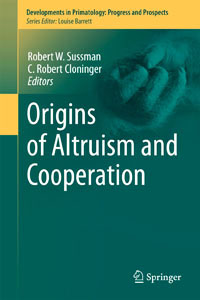The condition of man is a condition of war, wrote 17th-century philosopher Thomas Hobbes. A quick glance through history books and today’s news headlines certainly seems to support the longstanding idea that humans by nature are aggressive, selfish and antagonistic.

But this view simply doesn’t fit with scientific facts, write researchers featured in the new book Origins of Altruism and Cooperation (Springer, 2011), edited by Robert W. Sussman, PhD, and C. Robert Cloninger, MD. The book’s authors argue that humans are naturally cooperative, altruistic and social, only reverting to violence when stressed, abused, neglected or mentally ill.
The book, which now is available, presents evidence supporting this idea from a range of academic perspectives, including anthropology, psychiatry, biology, sociology, religion, medicine and more.
“Cooperation isn’t just a byproduct of competition, or something done only because both parties receive some benefit from the partnership,” says Sussman, professor of physical anthropology in Arts & Sciences. “Rather, altruism and cooperation are inherent in primates, including humans.”
For example, Sussman says, chimpanzees have been observed to adopt unrelated, orphaned infants, despite the significant amount of effort and time required to care for the infants.
Sussman and Cloninger write in the book’s preface that examining the influences that underlie human behavior is critical to understanding why conflicts arise among peoples and nations in the modern world and to finding the best ways to promote peaceful, productive interaction among humans worldwide.
“Prosocial behavior is an essential component of health and happiness in human beings,” says Cloninger, the Wallace Renard Professor of Psychiatry at the School of Medicine. “Selfish and uncooperative behavior, on the other hand, is a sign of mental dysfunction because it is strongly associated with life dissatisfaction and ill health.”
In addition to chapters co-authored by Sussman and Cloninger, the book includes articles by two other WUSTL faculty members — Peter Benson, PhD, assistant professor of sociocultural anthropology, and Jane Phillips-Conroy, PhD, professor of anatomy and neurobiology and of anthropology — and other academic experts from around the world.
Topics of the book’s chapters — which range from relationships among howler monkeys to the influences of modern Western culture on human spirituality — were taken from discussions and presentations held at a 2009 conference at WUSTL titled “Man the Hunted: The Origin and Nature of Human Sociality, Altruism and Well-Being.”
The conference, organized by Sussman and Cloninger, was the first of its kind to bring together international academics across disciplines to examine the evolution of cooperation, altruism and sociality in primates and humans.
The conference was sponsored by the National Science Foundation, the Wenner-Gren Foundation for Anthropological Research, the WUSTL Committee for Ethics and Human Values and the Anthropedia Foundation.
For more information about the book Origins of Altruism and Cooperation, visit springer.com/life+sciences/behavioural/book/978-1-4419-9519-3.
For more information about the 2009 conference, visit news.wustl.edu/news/Pages/13588.aspx.